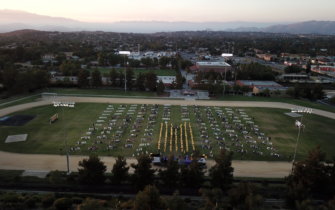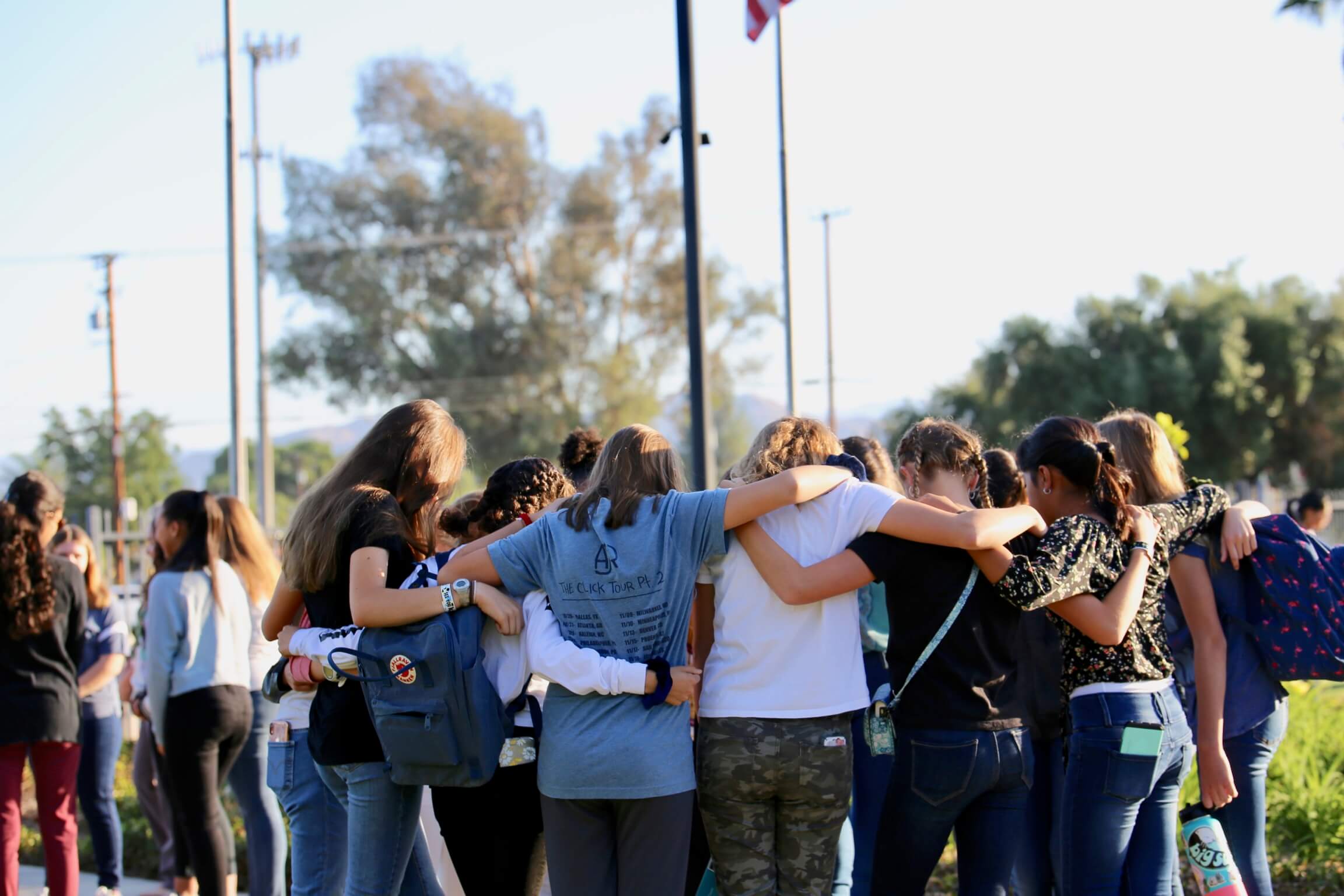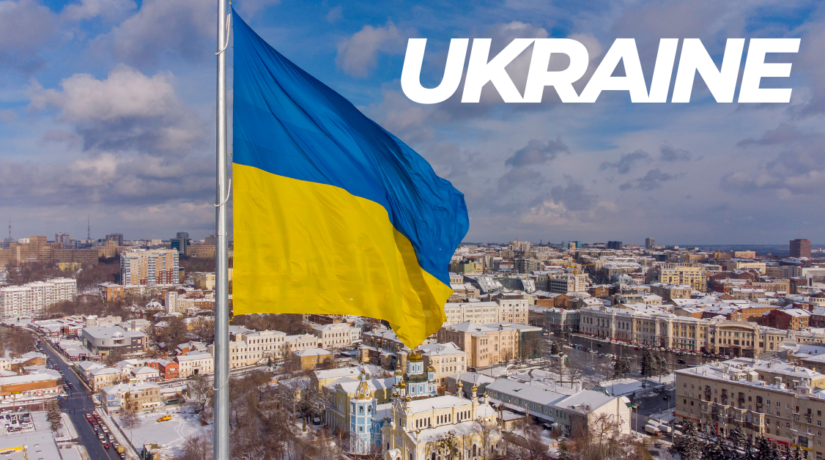ABOUT DARREN LOGAN
Darren Logan started out his career in the U.S. Army in West Germany where he witnessed the fall of the Berlin Wall and the dissolution of the Soviet Union. He served 13 years (1988-2001) as a commissioned officer, and would eventually work as a National Security and Intelligence Analyst with a focus on the Middle East from 1998-2001. Somewhere in that time, God laid a spiritual burden for the people of the Middle East on Darren’s heart. Darren and his family became cross-cultural missionaries to the area, moving first to the former Soviet Republic of Armenia where they lived for 10 years, then moving to Iraq where they lived until 2018. Returning stateside just a few years ago, Darren currently teaches High School Bible at Woodcrest Christian and draws upon his many years in the field of evangelism as he shares God’s Word with our students.
“Why do the nations rage and the peoples plot in vain?…He who sits in the heavens laughs; the Lord holds them in derision” (Psalm 2:1,4a, ESV)
Each week in my Bible classes here at Woodcrest Christian High School I open up a window to the world with my students. It usually happens on a Thursday when we have what I call “PFN” Day, Pray for the Nations day. I really look forward to these weekly PFN times. My prayer is that God will use them to help our students see the world beyond themselves; perhaps a little bit more as He sees it. I’m hopeful that my students will better understand that because God loves the world, His creation, and all the peoples in it, we should too. One of the main ways we can show our love of the nations is to be regularly in prayer for them.
A few weeks ago during one of our PFN days I focused our attention on the conflict that was brewing in eastern Europe between the countries of Ukraine and Russia. I had prepared a few presentation slides complete with some maps, graphs, and statistics. Additionally, a short prayer video on Ukraine was all queued up and ready to go. I wanted my students to try and see things from a Biblical perspective and consider what God might be doing in the current conflict in eastern Europe.
I went on to explain that Ukraine was a large country in eastern Europe. In fact, Ukraine is the largest country entirely within Europe. For comparison, I mentioned to my students that Ukraine is about the size of the U.S. state of Texas, and that it shares borders with several other countries in eastern Europe including Poland, Belarus, Romania, Moldova, Slovakia, Hungary, and perhaps most importantly, the massive nation of Russia to its east.
In the course of our discussion a few students went on to voice what I suspect several others may have also been thinking: Why should we as Americans care either way about what’s going on between Ukraine and Russia? I love that type of question! At times like this in my Bible classes I try to redirect our thoughts and hearts to some different and more significant questions: Does God care about what’s going on? If so, why? What does God actually think about the situation? Do you think it bothers God at all? Is there anything in the Bible that might inform our thinking at times like this? How ought we as Christians view this crisis? I stressed to my students that when we approach God’s Word carefully and prayerfully we will often discover the heart of God along the way. That is actually the greater answer we need anyhow. Moreover, in this way we are also more likely to find answers to other issues, for example, whether or not we should care about what’s going on in eastern Europe, or anywhere else in the world for that matter.
For this blog post, I have elaborated on the discussion held with my students in order to share some historical context and provide an understanding for how we as Christians can respond. From the wisdom found in Scripture which we can rely on for guidance to how we can be praying for Christians and the church in Ukraine, it is my hope that this information provides a Biblical understanding and assurance in the midst of unrest.
Current Situation: Russia Invades Ukraine!
As of this writing (February 25, 2022), following months of rising tensions along the Ukraine-Russia border, Vladimir Putin, the President of Russia, on February 21, 2022, unilaterally declared that two separatist-controlled regions within the sovereign borders of eastern Ukraine–and therefore not even in Russia!–were in fact to be independent states. This declaration was then “rubber-stamped” by the Duma, the Russian Parliament. This action was followed by initial movements of Russian “Peacekeepers,” the vast majority of whom had already been stationed near the border for weeks, into these areas of eastern Ukraine. It’s apparent that President Putin did this under the pretense of maintaining order, protecting Russians living there, and generally for the purposes of “keeping the peace.” These moves afforded President Putin all the leverage he needed to deepen overall Russian military presence in the region and launch an all-out invasion of Ukraine in the early morning hours of February 24, 2022.
At the moment, several major cities in Ukraine, including the capital, Kyiv, are being targeted by Russian missiles. Moreover, initial reports indicate that Russian military special forces are operating within these cities and seizing critical infrastructure locations to disrupt and cut the Ukrainian government’s ability to exercise command and control of its own forces. Russian armored and artillery units, together with long convoys of other Russian hardware and vehicles, are crossing borders into Ukraine from Belarus (to the north), Russia itself (to the east), and from Ukraine’s Crimea (to the south, and already occupied by Russia since 2014). Ukrainian government reports are already claiming many casualties and that number will almost certainly rise in the days ahead. Additionally, hundreds of thousands of Ukrainian civilians are fleeing toward the Polish and Romanian borders for safety, while many thousands more are hiding in underground subway stations that double as bomb shelters.
Current Global Response
Much of the international community, including the United States and its European allies, has spoken strongly against the Russian invasion. Some of the most significant economic sanctions ever enacted are now in place against Russia in an effort to restrain continued aggression. Furthermore, the North Atlantic Treaty Organization (NATO) has increased its military presence in NATO member states, primarily Poland and Romania. Because the United States is part of NATO, this build up also includes many thousands of U.S. military service members. The NATO alliance has committed all manner of support to Ukraine by providing a variety of defensive weapons (i.e. Javelin anti-tank missiles), logistical support, and intelligence support. What will almost certainly not be provided anytime soon, however, are actual NATO fighting forces on the ground in Ukraine simply because it is not currently a member state of the alliance. That is not to say, however, that Ukraine itself hasn’t wanted to join NATO for many years now. Quite the opposite is in fact true.
In fact, perhaps more than anything else, Ukraine joining NATO is what President Putin wants to prevent. Putin has felt threatened by the eastward expansion of NATO ever since the fall of the Soviet Union in the early 1990s. It seems as if Putin, a former Soviet KGB officer, has never really gotten over the disintegration of the Soviet Union. He made as much plain by delivering an emotionally-heated one-hour speech on February 21, 2022. In that speech he made several historically baseless and factually inaccurate claims all in an effort to justify a Russian invasion of Ukraine. This included the notion that Ukraine has always rightly belonged to Russia and was, for all intents and purposes, an illegitimate state that should never have been formed in the first place. He continued his argument claiming that it was in fact Ukraine that was the real security threat to Russia, and therefore, a Russian peremptory invasion would be justified. No one disputes the fact that, historically speaking, Russians and Ukrainians have indeed been extremely close culturally, linguistically, and religiously. For centuries Ukraine was controlled by Moscow, and it’s still considered by Vladimir Putin to be vital to Russian interests. During the Soviet era, for example, the economy of Ukraine was the second largest in the Soviet Union.
Russia’s Historical Context
However, Mr. Putin’s claims ignore plain historical realities. Since the fall of the U.S.S.R in the early 1990s, Ukraine has moved closer to the west economically, socially, and culturally. Moreover, this movement westward accelerated in 2014 as Russia invaded Crimea, in the south of Ukraine, and also intervened militarily in the Donbass region in eastern Ukraine. Freedom protests erupted all over Ukraine and it became clear that the Ukrainian people did not want heavy-handed Russian involvement in their country. This movement gained real momentum with the 2019 election of the current Ukranian president, the former actor and comedian, Volodymyr Zelenskyy, who has only deepened Ukraine’s ties with the west. In sum, when it comes to matters of foreign policy, it seems that President Putin is advancing a uniquely Russian brand of nationalism in which he hopes to re-establish Russia as a superpower and provide a strategic counterweight to U.S. global leadership. In addition to his involvement in Ukraine, within the last 15 years alone President Putin has also led Russia to expand its geopolitical influence by fomenting conflict in the Republic of Georgia (2008) and in the Syrian civil war (2015). At the same time and on a strategic level President Putin has made great moves toward a warming relationship with China, India, the Arab world, and Iran, all in an attempt to reduce American and Western influence in Asia.
Why should Ukraine matter to the United States?
The war between Ukraine and Russia should be of concern to us as Americans because Russia is a nuclear power with significant political and economic influence on the global stage. Over the last decade Russia has revealed itself not as a strategic partner but rather as a strategic competitor of the United States. The war in Ukraine has the potential to unleash unrest all over Europe and cause significant disruption economically, socially, and politically. Furthermore, since it is taking place literally on the “front porch” of our NATO allies, if the conflict were to spill over Ukraine’s borders, the United States will be treaty bound to enter the war directly.
Similarly, this current invasion likely signals President Putin’s grander ambition of expanding Russia’s influence not only over Ukraine but also over a much wider swath of eastern and central Europe. Therefore, the battle over Ukraine is consequential because it is essentially a “trial run” of sorts for Putin’s vision of what Europe should look like. Putin would like nothing more than to undo the post Cold War security architecture that’s been in place since the 1990s. Therefore, it is of tantamount importance that Russia’s aggression against Ukraine be stopped. Such territorial encroachment rarely stays confined to a particular area and it usually leads to wider destabilization regionally and perhaps even globally.
Finally, if this war escalates and widens, it will likely result in a humanitarian disaster. It could produce massive displacements of refugees, food shortages and possibly famine, and end in the loss of life for many civilians. It is important for us particularly as Christians in the United States to remember that the Ukrainians are our fellow human beings. Like us they bear the same image of God, and should not be subject to this unjust and unprovoked violence and oppression at the hands of Russia.
What Biblical principles should we consider?
Scripture is replete with wisdom and guidance for us at a time like this. The following scriptures reflect some principles that may be helpful as we consider how best to respond as Christians. I invite you to open your Bible to these verses and read carefully and prayerfully:
- God is sovereign over all the affairs of the world and He is always working in and through all of it for His greater glory and the good of His people:
- Job 12:23
- Psalm 2
- Psalm 22:28
- Proverbs 21:1
- Romans 13:1-7
- Romans 8:28
- God exalts the humble and opposes the proud:
- Psalm 138:6
- Proverbs 3:34
- Proverbs 29:23
- Matthew 23:12
- Luke 1:52
- James 4:6
- There have always been, and still are, wicked rulers on earth:
- Proverbs 28:15
- Proverbs 29:2
- Proverbs 29:4
- Isaiah 10:1
- Habbakuk 1:6
- Micah 7:3
- Yet, we know one day God will bring about final and perfect justice:
- Psalm 58:11
- Psalm 76:9
- Psalm 82:8
- Psalm 94:1-2
- Psalm 96:10
- Micah 4:3
- Matthew 16:27
- Matthew 25:31
- 2 Corinthians 5:10
- Revelation 1:7
- Revelation 11:18
How can we be praying for Christians and the church in Ukraine?
Finally, how does God want us, as Christians living in the United States at Woodcrest Christian, to respond in prayer to the current war raging in eastern Europe? I want to encourage you to consider the following as you pray:
- Pray that God will help you see His glory and power in the midst of such a great struggle. God has always worked in and through very difficult circumstances to draw people to himself. Pray especially that God would receive great glory from the Christian believers and His church in Ukraine during this crisis.
- Pray for God’s peace to be a source of strength to the Christian churches and believers in Ukraine. Ask God to provide many opportunities for them to make the Gospel message clear to those that are suffering and in need.
- Pray for God’s protection. Particularly, it is important to pray for the safety of non-combatants on both sides of this conflict. In the same way, pray also for spiritual protection that many would seek the truth of God when all else has been taken away from them.
- Pray that God will comfort the people of Ukraine as they have been living under the threat of war from Russia, and now actual war, since 2014 and the Russian invasion of the Crimea region. So many families have already lost fathers and sons in battle.
- Pray that God would graciously intervene and bring peace. This means we should be praying that world leaders would have wisdom as they lead at such a difficult moment. Pray that God would move in their hearts and guide their steps and plans. Pray for leaders of both countries to know God’s truth and peace and be transformed by his Holy Spirit, that they would seek to lead their countries in the way of peace.
- Ask God to bring about a spirit of repentance, grace, forgiveness and reconciliation. This means we should be praying not only for the leaders of these countries, but for the people — that they would not have animosity between them but be united in reconciliation.
- Finally, pray that God will not waste this moment in time to open doors of Gospel advance. God has a way of showing up when things are difficult. Pray that God would make His great name known all across Ukraine and Russia as the result of this conflict.















